新视野大学英语第三版电子教案book3unit
- 格式:doc
- 大小:124.50 KB
- 文档页数:15

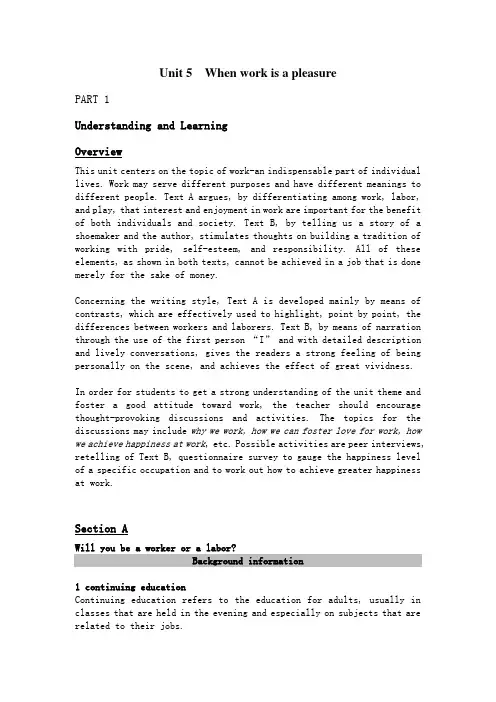
Unit 5 When work is a pleasurePART 1Understanding and LearningOverviewThis unit centers on the topic of work-an indispensable part of individual lives. Work may serve different purposes and have different meanings to different people. Text A argues, by differentiating among work, labor, and play, that interest and enjoyment in work are important for the benefit of both individuals and society. Text B, by telling us a story of a shoemaker and the author, stimulates thoughts on building a tradition of working with pride, self-esteem, and responsibility. All of these elements, as shown in both texts, cannot be achieved in a job that is done merely for the sake of money.Concerning the writing style, Text A is developed mainly by means of contrasts, which are effectively used to highlight, point by point, the differences between workers and laborers. Text B, by means of narration through the use of the first person “I” and with detailed description and lively conversations, gives the readers a strong feeling of being personally on the scene, and achieves the effect of great vividness.In order for students to get a strong understanding of the unit theme and foster a good attitude toward work, the teacher should encourage thought-provoking discussions and activities. The topics for the discussions may include why we work, how we can foster love for work, how we achieve happiness at work, etc. Possible activities are peer interviews, retelling of Text B, questionnaire survey to gauge the happiness level of a specific occupation and to work out how to achieve greater happiness at work.Section AWill you be a worker or a labor?Background information1 continuing educationContinuing education refers to the education for adults, usually in classes that are held in the evening and especially on subjects that are related to their jobs.2 experiential learningExperiential learning is the process of making meaning from direct experience. It is learning through reflection on doing, which is often contrasted with rote learning (死记硬背). Experiential learning focuses on the learning process for the individua1. An example of experiential learning is going to the zoo and learning through observation and interaction with the zoo environment, as opposed to reading about animals from a book. Thus, one makes discoveries and experiments with knowledge firsthand, instead of hearing or reading about others’ experiences.Detailed study of the text1 In a society where slavery in the strict sense has been abolished, the social indications around work, the value of work and the salary, have degraded many laborers into modern slaves-“wage slaves”.(Para. 1)Meaning: In a society where slavery, strictly speaking, has been put to an end, the social status of work, the value of work and the salary, have made many laborers become modern slaves-“wage slaves”.★ degrade:vt. treat sb. without respect and make them lose respect for themselves贬低(某人 );羞辱 (某人)The examination supervisor warned students not to degrade themselves by cheating on the exam.监考老师警告学生不要在考试中舞弊,以免自取其辱。
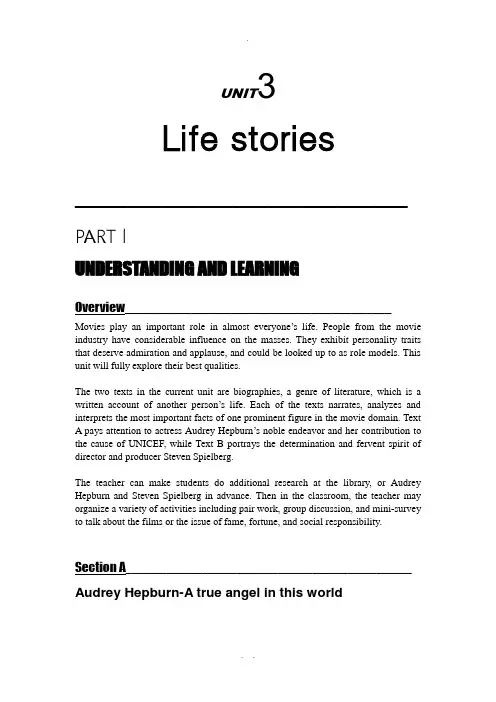
UNIT3Life stories___________________ PART lUNDERSTANDING AND LEARNINGOverview________________________________________ Movies play an important role in almost everyone’s life. People from the movie industry have considerable influence on the masses. They exhibit personality traits that deserve admiration and applause, and could be looked up to as role models. This unit will fully explore their best qualities.The two texts in the current unit are biographies, a genre of literature, which is a written account of another person’s life. Each of the texts narrates, analyzes and interprets the most important facts of one prominent figure in the movie domain. Text A pays attention to actress Audrey Hepburn’s noble endeavor and her contribution to the cause of UNICEF, while Text B portrays the determination and fervent spirit of director and producer Steven Spielberg.The teacher can make students do additional research at the library, or Audrey Hepburn and Steven Spielberg in advance. Then in the classroom, the teacher may organize a variety of activities including pair work, group discussion, and mini-survey to talk about the films or the issue of fame, fortune, and social responsibility.Section A_________________________________________________ Audrey Hepburn-A true angel in this world1 Audrey HepburnAudrey Hepburn(1929-1993) was a slender, stylish motion picture actress known for her radiant beauty, her ability to project an air of sophistication tempered by a charming innocence, and her tireless efforts to aid needy children.Although born in Belgium, Hepburn had British citizenship through her father and attended school in England as a child. In 1939, however, at the onset of World War II, her mother(Hepburn’s father left the family when she was six years old) moved the child to the Netherlands (where the author of this text mistakenly considered Hepburn was born), thinking the neutral country safer than England. Throughout World War II, Hepburn endured hardships in Nazi-occupied Holland. She still managed, however, to attend school and take ballet lessons. After the war, she continued to study ballet in Amsterdam and in London. During her early 20s, she studied acting and worked as a model and dancer. After appearing in several British films and starring in the 1951 Broadway play Gigi (《琪琪》), Hepburn gained instant Hollywood stardom for playing the Academy Award-winning lead role in Roman Holiday. She remains one of few entertainers who have won Academy, Emmy, Grammy, and Tony Awards. Hepburn’s war-time struggles inspired her passion for humanitarian work. She devoted much of her later life to UNICEF, visiting famine-stricken villages, in Latin America, Africa, until shortly before her death of cancer in 1993. She was awarded the Presidential Medal of Freedom in recognition of her work as a UNICEF Goodwill Ambassador in 1992.2 UNICEFUNICEF(United Nations International Children’s Emergency Fund) was created by the United Nations General Assembly on December 11,1946, to provide emergency food and healthcare to children in countries that had been devastated by World War II. After 1950 the fund directed its efforts toward general programs for the improvement of children’s welfare, particularly in less-developed countries and in various emergency situations. The organization’s broader mission was reflected in the name it adopted in 1953, the United Nations Children’s Fund, but it has continued to be known by the popular acronym based on this old name. Headquartered in New York City, UNICEF provides long-term humanitarian and developmental assistance to children and mothers in developing countries. UNICEF’s programs emphasize developing community-level services to promote the health and well-being of children.3 UNICEF Ambassador of GoodwillMany celebrities have acted as international, regional or national ambassadors, depending on their profile,interests, and desired level of responsibility. The role of Goodwill Ambassador allows celebrities with a demonstrated interest in UNICEFissues to use their fame to draw attention to important issues. This may take the form of public appearances and talks, visits to troubled regions, and use of their political access to advocate UNICEF causes, all of which have the power to draw attention from the media and to create public awareness.4 Gregory PeckGregory Peck (1916-2003) was one of the world’s most popular film stars from the 1940s to the 1960s. He is best known for his performance in the 1962 film To Kill a Mockingbird, which earned him the Academy Award for Best Actor.In 1967 Peck received the Academy’s Jean Hersholt Humanitarian Award. He was also in 1969 for his lifetime humanitarian effort. Always politically progressive, Peck was active in such causes as anti-war protests, workers’ rights and civil rights.5 Billy WilderBilly Wilder (1906-2002) was an Austrian-born American filmmaker, screenwriter, producer artist, and journalist. His career spanned more than 50 years and 60 films. He is regarded as one of the most brilliant and versatile filmmakers of Hollywood’s golden age. During his career, Wilder gained 20 Academy Award nominations and won six Oscars. He received a lifetime achievement award from the American Film Institute in 1986.6Academy AwardsAn Academy Award (byname Oscar) is an award presented annually by the American Academy of Motion Picture Arts and Science to recognize excellence of professionals in the film industry, including directors , actors , and writers. The award ceremony is one of the most prominent award ceremonies in the world, and is televised live in more than 200 countries annually.7 Hubert de GivenchyHubert de Givenchy (1927-,) is a French aristocrat and fashion designer who founder The House of Givenchy in 1952. He is famous for having designed much of the personal and professional wardrobe of Audrey Hepburn, as well as clothing for clients such as Jacqueline Kennedy. He was named to the International Best Dress List Hall of Fame in 1970.Detailed study of the text1Audrey Hepburn thrilled audiences with starring roles in noteworthy films... (Para.1)Meaning: Audrey Hepburn played leading roles in many extraordinary films, and such poles gave great pleasure to the people who watched the films…★noteworthy: a. important or interesting enough to deserve your attention 值得注意的;显著的One of the most noteworthy trends in contemporary American higher education is the tendency among community colleges to offer certificate programs besides the traditional associate degrees.当代美国高等教育最显著的趋势之一就是社区大学除了授予传统的副学士学位,还开设学历课程。
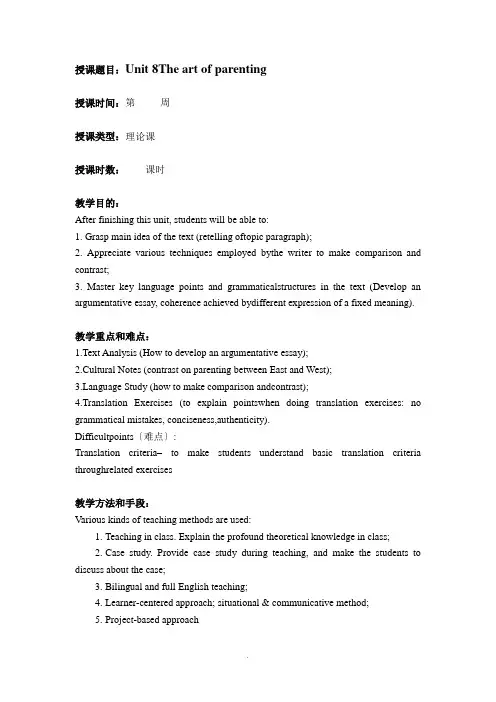
授课题目:Unit 8The art of parenting授课时间:第_____周授课类型:理论课授课时数:____课时教学目的:After finishing this unit, students will be able to:1. Grasp main idea of the text (retelling oftopic paragraph);2. Appreciate various techniques employed bythe writer to make comparison and contrast;3. Master key language points and grammaticalstructures in the text (Develop an argumentative essay, coherence achieved bydifferent expression of a fixed meaning).教学重点和难点:1.Text Analysis (How to develop an argumentative essay);2.Cultural Notes (contrast on parenting between East and West);nguage Study (how to make comparison andcontrast);4.Translation Exercises (to explain pointswhen doing translation exercises: no grammatical mistakes, conciseness,authenticity).Difficultpoints〔难点〕:Translation criteria–to make students understand basic translation criteria throughrelated exercises教学方法和手段:Various kinds of teaching methods are used:1.Teaching in class. Explain the profound theoretical knowledge in class;2.Case study. Provide case study during teaching, and make the students to discuss about the case;3.Bilingual and full English teaching;4.Learner-centered approach; situational & communicative method;5.Project-based approach教学内容和过程:Section A Reflections of a Chinese mother in the westStep One Warming-up Activities30 minutesQ1: Is your mother a Tiger Mother? What would your parents do if you failed to meet their expectations?Yes.Assume strength rather than fragility;Be strict with me;Not permit me to do …;Physically punish me.Q2: Have you ever hated your parents when they forced you to do something you disliked but which later proved to be worthy of your efforts?Yes.Force me to learn the Chinese calligraphy;Physically punished me because of my lack ofself-discipline;Be all for my good;Better appreciate traditional culture;Foster patience and persistence;Be forever grateful for their guidance.Q3:Which teaching method is better, Chinese parenting or western parenting? Chinese patenting:obedience and discipline;focus on children’s IQ development;perfect grades;land a satisfactory job.Western parenting:freedom; a happy childhood;more encouragement;a relaxed environment;mental health.Cultural background1. What is the most popular grading system in the United States?Discrete evaluation in the form of letter grades;Follow a five-point system, using the letters A, B, C, D and F;A indicating excellent, C indicating average and F indicating failing.2. What is the core of Confucianism?Humanism, the belief that human beings are teachable, improvable and perfectible through personal and communal endeavor especially including self-cultivation and self-creation.3. What can children do in the sleep-away camps?Sleep under the stars with friends;Learn to shoot a bow and arrow;Spend entire days in their swimming suits, etc.There are all kinds of camps, and all offer opportunities for kids to engage in new skills while also immersing themselves in familiar pursuits.Step Two Text Study 80 minutesI.Interactive reading of the textMain ideas of the partsThis text is an argumentative essay. Western parents are ________________ Chinese parents’success of raising kids. (Para.1)baffled aboutWhat do Westerners think of Chinese parents’way of raising kids? (Para. 2) provocative, unimaginable and even illegalDifferences between Chinese mothers and Western parents to an obese child (Para. 2): Chinese mothersWestern parentsPart I —(Paras. 1- __)Chinese parents raise successful kids, but they use some methods which are ________________________ to Westerners.unacceptable (or different)Part II —(Paras. 3-10)It contains three sections and explains in detail what the three ideological differences are.Why do Western parents want to protect their children from criticism? (Para. 3) Children are tender and not strong;Parents should protect their children’s self-esteem and protect children against thefeeling of failure.The child comes home with a B (Paras. 4-5)Western parentsChinese parentsa screaming, hair-tearing explosionpraise the childexpress disapprovalget practice testsworry about theirchilduse every tool to get her child’s grade up to an AWhy do Chinese parents demand perfect grades? (Para. 6)Because they take it for granted that their child can get them, and grades are a more important measure of success than “self-esteem〞.the second ideological difference (Paras.7-8)Chinese parents believe their kids ______ them everything. (Para. 7)Most Westerners don’t believe their offspring must show permanent ____________ to their parents. (Para. 8)the third ideological differenceMain idea of the parts Para. 9Para. 9Third, Chinese parents believe they know what’s best for their children and therefore have ultimate _________________ their children’s desires and preferences. Chinese children have no rights to __________, which is why Chinese daughters can’t have boyfriends in highschool and there are no late curfews or trips to sleep-away camps. Also even the slightest ___________ or _____________, anything less than unquestioning obedience, is extinguished, and punished into ______________. According to Western propaganda, what are Asian mothers like? (Para.10)Which parenting method is more beneficial tochildren’s success in the future, according tothe author? (Para.11)Chinese parenting is more effective in equipping their children with skills, work habits and inner confidence for success in the future.Part III —(Para. 11)The Chinese parenting method is more __________ and __________ because it can better prepare their children for the future.Summary of the textReflections of a Chinese mother in the WestWestern parents are _________ by Chinese parents’success of raising kids. Chinese parents do things that seem provocative, unimaginable, even _________, to opinionated Westerners. There are three ideological differences between Chinese and Western parents.First, Western parents cradle their children’s ____________ to insulate them from criticism. Chinese parents assume their kid is hardy enough to take the criticism. Second, Chinese parents believe their kids ______ them everything. Most Westerners don’t believe their offspring must show permanent ____________ to their parents. Third, Chinese parents consider they know what’s best for their children and therefore have ultimate _____________ their children’s desires and preferences.Of course there is also some _______All decent parents want to do what’s best for their children. It’s the ____________ that’s different. The Chinese parenting method is more practical and _______ because it can better prepare their children for the future.Language focusPractical phrase:1. dispense with摒弃;不用〔做〕年轻人应该学会节俭,摒弃一切不必要的奢侈品。
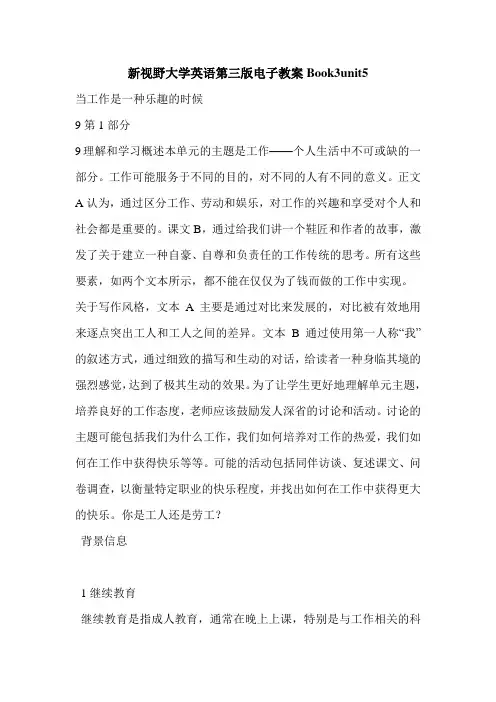
新视野大学英语第三版电子教案Book3unit5当工作是一种乐趣的时候9第1部分9理解和学习概述本单元的主题是工作——个人生活中不可或缺的一部分。
工作可能服务于不同的目的,对不同的人有不同的意义。
正文A认为,通过区分工作、劳动和娱乐,对工作的兴趣和享受对个人和社会都是重要的。
课文B,通过给我们讲一个鞋匠和作者的故事,激发了关于建立一种自豪、自尊和负责任的工作传统的思考。
所有这些要素,如两个文本所示,都不能在仅仅为了钱而做的工作中实现。
关于写作风格,文本A主要是通过对比来发展的,对比被有效地用来逐点突出工人和工人之间的差异。
文本B通过使用第一人称“我”的叙述方式,通过细致的描写和生动的对话,给读者一种身临其境的强烈感觉,达到了极其生动的效果。
为了让学生更好地理解单元主题,培养良好的工作态度,老师应该鼓励发人深省的讨论和活动。
讨论的主题可能包括我们为什么工作,我们如何培养对工作的热爱,我们如何在工作中获得快乐等等。
可能的活动包括同伴访谈、复述课文、问卷调查,以衡量特定职业的快乐程度,并找出如何在工作中获得更大的快乐。
你是工人还是劳工?背景信息1继续教育继续教育是指成人教育,通常在晚上上课,特别是与工作相关的科目。
2体验式学习体验式学习是从直接经验中创造意义的过程。
它是通过对做的反思来学习,这是由死记硬背来控制的。
19919体验式学习的例子是去动物园,通过观察和与动物园环境的互动来学习,而不是从书中阅读关于动物的内容。
因此,一个人用第一手知识进行发现和实验,而不是听或读别人的经历。
在一个严格意义上的奴隶制已经被废除的社会中,围绕工作的社会条件、工作的价值和工资,已经使许多劳动者沦为现代奴隶——“雇佣奴隶”。
(第106段)。
1)含义:在一个严格意义上已经结束奴隶制的社会里,工作的社会地位,工作的价值和工资,何说,中国政府将继续贯彻“一国两制”的方针。
监考老师警告学生不要在考试中作弊,以免他们侮辱自己。
注这里的“工资奴隶”是指那些仅仅为了赚取工资而工作的人。
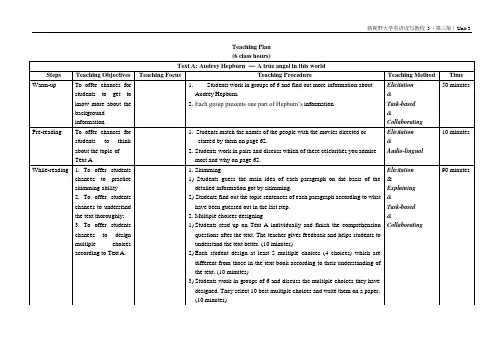
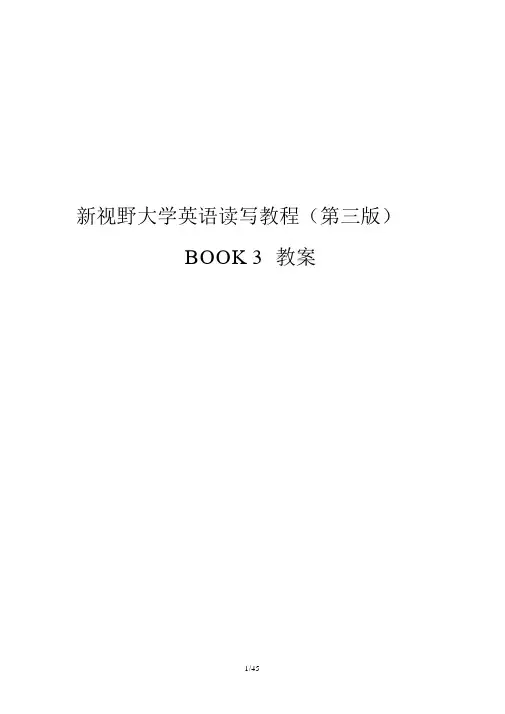
新视野大学英语读写教程(第三版)BOOK 3 教案章节Unit One: The Way to SuccessSection A: New Words and Expressions教案内容Text: Never, ever give up!Exercises: Vocabulary, Sentence Structure,Translation Listening, Speaking & Writing Skills教案目的1.To talk about the secret of success。
2. To further understand the text。
3.To apply the phrases and patterns。
4.To master the essay writing skill。
1. Clearly know the structure of the passage。
2. Master the important language points。
教案要求3.Briefly summarize the passage alone。
4.Correctly use and master the key words in this unit.重点难点1.The structure of the whole passagediscussed and the writing waysmentioned in this passage2.The reading skills mentioned in this unit3.listening practicing related to the contents learned in this unit1.The use of the new words and phrases in this passage2.The writing ways mentioned in this passage3.Some important sentence structures课堂设计Step 1: Lead-in10m Questioning&The Discussing Questioning&First Step 2: Pre-reading Activities10m DiscussingTwoLecturing,PeriodsStep 3: New Words80m Questioning&Giving Examples The Step 1: Background Information10m Questioning& Second DiscussingTwo Step 2: Structure Analysis10m LecturingPeriodsLecturing, Step 3: Language points and Difficult70m Questioning&SentencesGiving ExamplesStep 4: Comprehension of the Text A10m Questioning&DiscussingStep 1: Summarize the passage orally20m Questioning& DiscussingTheStep 2:Exercises (Words in use, WordThird Questioning& building,Banked cloze, Expressions in use,70mTwoTranslation in Section A)DiscussingPeriodsLecturing, Step 3: Revision & Homework10m QuestioningStep 1: Check Homework30m QuestioningTheStep 2:Structured Writing30m Watching &Forth DiscussingTwoStep 3: Listening20m Listening &Periods QuestioningStep 4: Speaking20m Questioning & Discussing教学过程The First Two Periods:Step 1: Lead-in:1.What is success?2.What do you think are the secrets of success?Step 2: Pre-reading Activities:1. Listen to a talk about steps to make your dreams come true. Fill in the blanksbased on what you hear.2. Listen to the talk again and discuss the following questions.Step 3: New WordsThe Second Two Periods:Step 1: Background Information1. Public schools in the UK & US2. Winston ChurchillStep 2: Structure AnalysisPart I (Paras.1-2): By using Winston Churchill’ s story and his speech at Harrow as anintroduction to the topic, the text makes clear its statement: thesecret of success is“ Never give up”.Part II (Paras.3-7): Through the examples of world famous scientists, statesman, andjurist, the text brings forward the statement that only those with astrong will , those who“ keep their eyes on the prize” , and those whoexpend the substantial effort to keep going, will finally succeed.Part III (Paras 8): By reinforcing the statement given in part II, the text draws theconclusion that with hard work, determination, dedication andpreparation, you can transcend any handicap, accomplish any feat,and achieve success.Step 3: Language points and Difficult SentencesPractical Phrases1. deviate from ⋯偏离,背离⋯⋯2. preclude sb. from doing阻止某⋯人做⋯⋯3. triumph over战胜⋯⋯⋯4. in (the) pursuit of追⋯求⋯⋯5. work one’ s 。
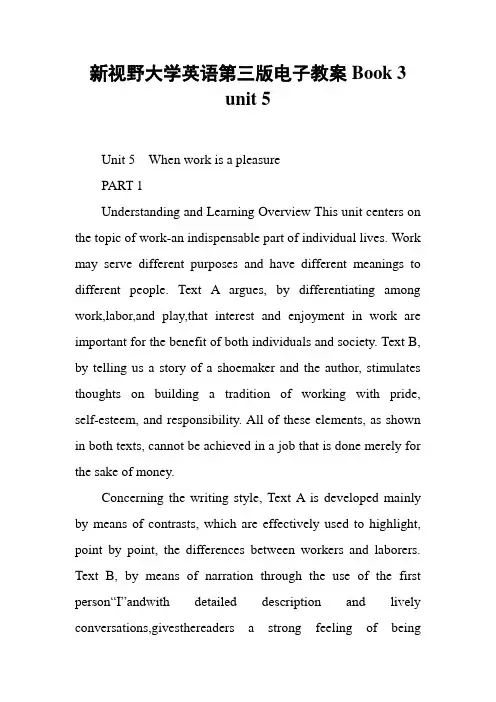
新视野大学英语第三版电子教案Book 3unit 5Unit 5 When work is a pleasurePART 1Understanding and Learning Overview This unit centers on the topic of work-an indispensable part of individual lives. Work may serve different purposes and have different meanings to different people. Text A argues, by differentiating among work,labor,and play,that interest and enjoyment in work are important for the benefit of both individuals and society. Text B, by telling us a story of a shoemaker and the author, stimulates thoughts on building a tradition of working with pride, self-esteem, and responsibility. All of these elements, as shown in both texts, cannot be achieved in a job that is done merely for the sake of money.Concerning the writing style, Text A is developed mainly by means of contrasts, which are effectively used to highlight, point by point, the differences between workers and laborers. Text B, by means of narration through the use of the first person“I”andwith detailed description and lively conversations,givesthereaders a strong feeling of beingpersonally on the scene,and achieves the effect of great vividness.In order for students to get a strong understanding ofthe unit theme and foster a good attitude toward work,the teacher should encourage thought-provoking discussions and activities. The topics for the discussions may includewhy we work, how we can foster love for work, how we achieve happiness at work, are peer interviews,retellingof Text B, questionnaire survey to gauge thehappiness level of a specific occupation and towork out how to achieve greater happiness at work.Section A Will you be a worker or a laborBackground information1 continuing educationContinuing education refers to the education for adults, usually in classes that are held in the evening and especially on subjects that are related to their jobs.2 experiential learningExperiential learning is the process of making meaning from direct experience. It is learning through reflection on doing, which is often contrasted with rote learning (死记硬背). Experiential learning focuses on the learning process for the individua1. An1example of experiential learning is going to the zoo and learning through observation and interaction with the zoo environment, as opposed to reading about animals from a book. Thus, one makes discoveries and experiments with knowledge firsthand, instead of hearing or reading about others’ experiences.Detailed study of the text1 In a society where slavery in the strict sense has been abolished, the socialindications around work,the value of work and the salary, have degraded many laborers into modern slaves-“wage slaves”.(Para. 1)Meaning: In a society where slavery, strictly speaking, has been put to an end, the social status of work, the value of work and the salary, have made many laborersbexxe modern slaves-“wage slaves”.★degrade:vt. treat sb. without respect and make them lose respect for themselves贬低(某人);羞辱(某人)The examination supervisor warned students not to degrade themselves by cheating on the exam.监考老师警告学生不要在考试中舞弊,以免自取其辱。

新视野大学英语第三版电子教案B o o k-3-U n i t-33l’s . . , . . , a , a ’s . , .A ’s ,B ., . ,a , , , , .1(1929-1993) a , , a , .Belgium, England a . 1939, , ,(’s ) ( ), . ,Holland. , , . , Amsterdam London.20s, a . 1951 (《琪琪》), . , , , .’s . , , , Africa, 1993.a 1992.2( ’s ) 11, 1946, .1950 ’s , . ’s1953, ’s , . , . ’s .3, , , , .a . , , ,.4(1916-2003) ’s 1940s 1960s.1962 a , .1967 ’s . 1969 . , , ’ .5(1906-2002) , , , . 50 60 . Hollywood’s . , 20 . a 1986.6( ) , , , . , 200 .7(1927-,) a1952. , . 1970.1 ... (.1): , …★: a. 值得注意的;显著的.当代美国高等教育最显著的趋势之一就是社区大学除了授予传统的副学士学位,还开设学历课程。
2 , . (. 2): a , .★: n.[C] (.) , , , . a , , . (活动、兴趣或知识的)领域,范围,范畴.临床领域近期的研究得益于多种测量方法结合使用。
★: .1) a a , , 扮演(角色). 听说波特曼学习舞蹈是为了更好的扮演她的角色。
2) (~ . / . .) . . a , 把某人/某物描写成某种样子.律师往往将自己的当事人描述成受人误导的贫困青年。
3 a ( ’s ) . (.2): a .★: a. a 模范的;可作楷模的a . 玛丽对学生而言是一位模范教师,对同事而言是一位值得信任和珍惜的朋友。
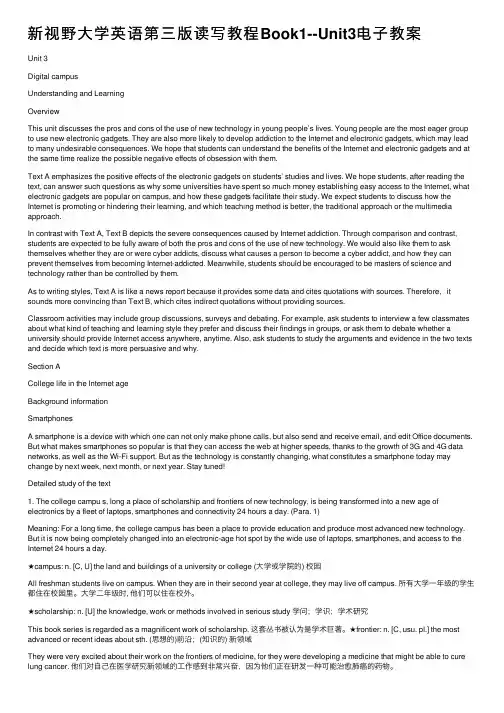
新视野⼤学英语第三版读写教程Book1--Unit3电⼦教案Unit 3Digital campusUnderstanding and LearningOverviewThis unit discusses the pros and cons of the use of new technology in young people’s lives. Young people are the most eager group to use new electronic gadgets. They are also more likely to develop addiction to the Internet and electronic gadgets, which may lead to many undesirable consequences. We hope that students can understand the benefits of the Internet and electronic gadgets and at the same time realize the possible negative effects of obsession with them.Text A emphasizes the positive effects of the electronic gadgets on students’ studies and lives. We hope students, after reading the text, can answer such questions as why some universities have spent so much money establishing easy access to the Internet, what electronic gadgets are popular on campus, and how these gadgets facilitate their study. We expect students to discuss how the Internet is promoting or hindering their learning, and which teaching method is better, the traditional approach or the multimedia approach.In contrast with Text A, Text B depicts the severe consequences caused by Internet addiction. Through comparison and contrast, students are expected to be fully aware of both the pros and cons of the use of new technology. We would also like them to ask themselves whether they are or were cyber addicts, discuss what causes a person to become a cyber addict, and how they can prevent themselves from becoming Internet-addicted. Meanwhile, students should be encouraged to be masters of science and technology rather than be controlled by them.As to writing styles, Text A is like a news report because it provides some data and cites quotations with sources. Therefore,it sounds more convincing than Text B, which cites indirect quotations without providing sources.Classroom activities may include group discussions, surveys and debating. For example, ask students to interview a few classmates about what kind of teaching and learning style they prefer and discuss their findings in groups, or ask them to debate whether a university should provide Internet access anywhere, anytime. Also, ask students to study the arguments and evidence in the two texts and decide which text is more persuasive and why.Section ACollege life in the Internet ageBackground informationSmartphonesA smartphone is a device with which one can not only make phone calls, but also send and receive email, and edit Office documents. But what makes smartphones so popular is that they can access the web at higher speeds, thanks to the growth of 3G and 4G data networks, as well as the Wi-Fi support. But as the technology is constantly changing, what constitutes a smartphone today may change by next week, next month, or next year. Stay tuned!Detailed study of the text1. The college campu s, long a place of scholarship and frontiers of new technology, is being transformed into a new age of electronics by a fleet of laptops, smartphones and connectivity 24 hours a day. (Para. 1)Meaning: For a long time, the college campus has been a place to provide education and produce most advanced new technology. But it is now being completely changed into an electronic-age hot spot by the wide use of laptops, smartphones, and access to the Internet 24 hours a day.★campus: n. [C, U] the land and buildings of a university or college (⼤学或学院的) 校园All freshman students live on campus. When they are in their second year at college, they may live off campus. 所有⼤学⼀年级的学⽣都住在校园⾥。

教学目标:1. 理解并掌握本单元的关键词汇和短语。
2. 分析文章结构,提高阅读理解能力。
3. 学会运用本单元的语法知识,进行有效的写作练习。
4. 培养学生对环境保护的关注和责任感。
教学重点:1. 关键词汇和短语的理解与运用。
2. 文章结构的分析。
3. 语法知识的运用。
教学难点:1. 文章主旨的把握。
2. 语法知识的灵活运用。
教学准备:1. 教师准备PPT,包括本单元的课文、词汇、语法等内容。
2. 学生准备好笔记本、笔等学习用品。
教学过程:一、导入1. 教师简要介绍本单元的主题,即环境保护。
2. 学生分享自己了解的环境保护知识和经验。
二、课文讲解1. 阅读课文,理解文章大意。
2. 分析文章结构,找出文章的主旨。
3. 教师讲解关键词汇和短语,如:environmental protection、global warming、greenhouse gases等。
4. 分析文章中的语法知识,如:现在分词作状语、过去分词作定语等。
三、练习环节1. 词汇练习:让学生根据课文内容,找出本单元的关键词汇和短语,并进行造句练习。
2. 阅读理解练习:让学生阅读相关材料,回答问题,检验对文章内容的理解程度。
3. 写作练习:让学生运用本单元的语法知识,写一篇关于环境保护的短文。
四、课堂讨论1. 学生分组讨论,分享自己对环境保护的看法和建议。
2. 教师引导学生思考如何从自身做起,为环境保护贡献力量。
五、总结与作业1. 教师对本节课的内容进行总结,强调环境保护的重要性。
2. 布置作业:让学生写一篇关于环境保护的短文,要求运用本单元的语法知识和词汇。
教学反思:1. 本节课通过讲解课文、词汇和语法,使学生掌握了本单元的知识。
2. 课堂讨论环节有助于培养学生的环保意识和责任感。
3. 教师应关注学生的个体差异,针对不同层次的学生进行有针对性的教学。
授课题目:Unit 3—Audrey Hepburn - A true angel in this world 授课时间:第_____周授课类型:理论课授课时数:____课时教学目的:After finishing this unit, students will be able to:1.To talk about Audrey Hepburn’s life story2.To fully understand the text3.To apply the phrases and patterns4.To master the essay writing skill教学重点和难点:1.To talk about a person’s life storyunderstand the text fullyapply the phrases and patternsmaster skill of writing a narrative essay in chronological order教学方法和手段:Various kinds of teaching methods are used:1.Teaching in class. Explain the profound theoretical knowledge in class;2.Case study. Provide case study during teaching, and make the students to discuss about the case;3.Bilingual and full English teaching;4.Learner-centered approach; situational & communicative method;5.Project-based approach教学内容和过程:Section A Audrey Hepburn - A true angel in this worl dPre-reading ActivitiesStep 1. GreetingsGreet the whole class warmly.Step 2. Lead-in and preparation for readingQuotes:Go confidently in the direction of your dreams. Live the life you’ve imagined.— Henry David ThoreauDon’t judge each day by the harvest you reap, but by the seeds you plant.— Robert Louis StevensonLet them talk to each other about the following questions:1. Match the names of the people with the movies directed or starred by them.was Audrey Hepburn3. Can you name some of the famous movies starred by Audrey4. How did Audrey Hepburn influence the worldWatch and talkWatch the video about Audrey Hepburn, take down the key points and then make a presentation about her life story.1929-1944 a ballet dancer1948-1951 a young actress1952-1953 a successful actress1954-1989 a mature actress1988-1993 a great humanitarianCultural background: UNICEFQuestions Previewing1. How did UNICEF come into beingUNICEF (United Nations International Children’s Emergency Fund) was created by theUnited Nations General Assembly on December 11, 1946, to provide emergency food andhealthcare to children in countries that had been devastated by World War II.2. What is UNICEF’s major taskUNICEF provides long-term humanitarian and developmental assistance to children andmothers in developing countries. UNICEF’s programs emphasize developing communitylevel services to promote the health and well-being of children.3. What is the role of UNICEF Ambassador of GoodwillThe role of Goodwill Ambassador allows celebrities with a demonstrated interest in UNICEF issues to use their fame to draw attention to important issues and create public awareness.Step 3. Fast readingAsk the Students to read the passage as quickly as they can and then answer the questions on the screen. Let them get the main idea of each paragraph and make clear about the text structure.Text structure: ( structured writing ) The passage can be divided into 3 parts.Part I — (Paras. 1-2)Audrey Hepburn was successful in the film domain, but she most preferred playing the roles of a mother and a UNICEF Goodwill Ambassador.Part II — (Paras. 3- 14)This part tells of the life story of Audrey Hepburn. She transcended the challenges in her earlier life and became an internationally famous actress. But she remained a generous, simple and compassionate woman and devoted her later years to humanitarian work as a Goodwill Ambassador for UNICEF. Though she died of cancer, her passion for service was enduring.Part III — (Para. 15)From Audrey’s words, we can see the majesty of her spirit of social responsibility and dedication.Structure of the textPurpose: Improve the students’ reading and writing ability and understand the general idea of each paragraph.Method: Read the text individually and talk in groups; Use task-based language teaching method, reading approach, communicative approach and total physical response method.Step 4: While-reading ActivitiesStudents are required to look at the Words and Phrases on the screen and give a brief presentation in class.Words and Phrases:Purpose: Train the Students’ ability of understandi ng and using foreign language.Method: Talk in groups, Use task-based language teaching method, communicative approach and total physical response method.Practical phrases1. be afflicted by 受…痛苦;受…折磨由于遭受无休止战争的折磨,人们生活在极度贫困之中。
新视野大学英语读写教程(第三版)BOOK 3 教案UNIT3Life stories___________________ PART lUNDERSTANDING AND LEARNINGOverview________________________________________ Movies play an important role in almost everyone’s life. People from the movie industry have considerable influence on the masses. They exhibit personality traits that deserve admiration and applause, and could be looked up to as role models. This unit will fully explore their best qualities.The two texts in the current unit are biographies, a genre of literature, which is a written account of another person’s life. Each of the texts narrates, analyzes and interprets the most important facts of one prominent figure in the movie domain. Text A pays attention to actress Audrey Hepburn’s noble endeavor and her contribution to the cause of UNICEF, while Text B portrays the determination and fervent spirit of director and producer Steven Spielberg.The teacher can make students do additional research at the library, or Audrey Hepburn and Steven Spielberg in advance. Then in the classroom, the teacher may organize a variety of activities including pair work, group discussion, and mini-survey to talk about the films or the issue of fame, fortune, and social responsibility.Section A_________________________________________________ Audrey Hepburn-A true angel in this world1 Audrey HepburnAudrey Hepburn (1929-1993) was a slender, stylish motion picture actress known for her radiant beauty, her ability to project an air of sophistication tempered by a charming innocence, and her tireless efforts to aid needy children.Although born in Belgium, Hepburn had British citizenship through her father and attended school in England as a child. In 1939, however, at the onset of World War II, her mother(Hepburn’s father left the family when she was six years old) moved the child to the Netherlands (where the author of this text mistakenly considered Hepburn was born), thinking the neutral country safer than England. Throughout World War II, Hepburn endured hardships in Nazi-occupied Holland. She still managed, however, to attend school and take ballet lessons. After the war, she continued to study ballet in Amsterdam and in London. During her early 20s, she studied acting and worked as a model and dancer. After appearing in several British films and starring in the 1951 Broadway play Gigi (《琪琪》), Hepburn gained instant Hollywood stardom for playing the Academy Award-winning lead role in Roman Holiday. She remains one of few entertainers who have won Academy, Emmy, Grammy, and Tony Awards. Hepburn’s war-time struggles inspired her passion for humanitarian work. She devoted much of her later life to UNICEF, visiting famine-stricken villages, in Latin America, Africa, until shortly before her death of cancer in 1993. She was awarded the Presidential Medal of Freedom in recognition of her work as a UNICEF Goodwill Ambassador in 1992.2 UNICEFUNICEF (United Nations International Children’s Emergency Fund) was created by the United Nations General Assembly on December 11, 1946, to provide emergency food and healthcare to children in countries that had been devastated by World War II. After 1950 the fund directed its efforts toward general programs for the improvement of children’s welfare, particularly in less-developed countries and in various emergency situations. The organization’s broader mission was reflected in the name it adopted in 1953, the United Nations Children’s Fund, but it has continued to be known by the popular acronym based on this old name. Headquartered in New York City, UNICEF provides long-term humanitarian and developmental assistance to children and mothers in developing countries. UNICEF’s programs emphasize developing community-level services to promote the health and well-being of children.3 UNICEF Ambassador of GoodwillMany celebrities have acted as international, regional or national ambassadors, depending on their profile, interests, and desired level of responsibility. The role of Goodwill Ambassador allows celebrities with a demonstrated interest in UNICEF issues to use their fame to draw attention to important issues. This may take the formof public appearances and talks, visits to troubled regions, and use of their political access to advocate UNICEF causes, all of which have the power to draw attention from the media and to create public awareness.4 Gregory PeckGregory Peck (1916-2003) was one of the world’s most popular film stars from the 1940s to the 1960s. He is best known for his performance in the 1962 film To Kill a Mockingbird, which earned him the Academy Award for Best Actor.In 1967 Peck received the Academy’s Jean Hersholt Humanitarian Award. He was also in 1969 for his lifetime humanitarian effort. Always politically progressive, Peck was active in such causes as anti-war protests, workers’ rights and civil rights.5 Billy WilderBilly Wilder (1906-2002) was an Austrian-born American filmmaker, screenwriter, producer artist, and journalist. His career spanned more than 50 years and 60 films. He is regarded as one of the most brilliant and versatile filmmakers of Hollywood’s golden age. During his career, Wilder gained 20 Academy Award nominations and won six Oscars. He received a lifetime achievement award from the American Film Institute in 1986.6 Academy AwardsAn Academy Award (byname Oscar) is an award presented annually by the American Academy of Motion Picture Arts and Science to recognize excellence of professionals in the film industry, including directors , actors , and writers. The award ceremony is one of the most prominent award ceremonies in the world, and is televised live in more than 200 countries annually.7 Hubert de GivenchyHubert de Givenchy (1927-,) is a French aristocrat and fashion designer who founder The House of Givenchy in 1952. He is famous for having designed much of the personal and professional wardrobe of Audrey Hepburn, as well as clothing for clients such as Jacqueline Kennedy. He was named to the International Best Dress List Hall of Fame in 1970.Detailed study of the text1 Audrey Hepburn thrilled audiences with starring roles in noteworthy films... (Para.1)Meaning: Audrey Hepburn played leading roles in many extraordinary films, and such poles gave great pleasure to the people who watched the films…★noteworthy: a. important or interesting enough to deserve your attention 值得注意的;显著的One of the most noteworthy trends in contemporary American higher education is the tendency among community colleges to offer certificate programs besides the traditional associate degrees.当代美国高等教育最显著的趋势之一就是社区大学除了授予传统的副学士学位,还开设学历课程。
新视野大学英语读写教程(第三版)BOOK 3 教案UNIT3Life stories___________________ PART lUNDERSTANDING AND LEARNINGOverview________________________________________ Movies play an important role in almost everyone’s life. People from the movie industry have considerable influence on the masses. They exhibit personality traits that deserve admiration and applause, and could be looked up to as role models. This unit will fully explore their best qualities.The two texts in the current unit are biographies, a genre of literature, which is a written account of another person’s life. Each of the texts narrates, analyzes and interprets the most important facts of one prominent figure in the movie domain. Text A pays attention to actress Audrey Hepburn’s noble endeavor and her contribution to the cause of UNICEF, while Text B portrays the determination and fervent spirit of director and producer Steven Spielberg.The teacher can make students do additional research at the library, or Audrey Hepburn and Steven Spielberg in advance. Then in the classroom, the teacher may organize a variety of activities including pair work, group discussion, and mini-survey to talk about the films or the issue of fame, fortune, and social responsibility.Section A_________________________________________________ Audrey Hepburn-A true angel in this world1 Audrey HepburnAudrey Hepburn (1929-1993) was a slender, stylish motion picture actress known for her radiant beauty, her ability to project an air of sophistication tempered by a charming innocence, and her tireless efforts to aid needy children.Although born in Belgium, Hepburn had British citizenship through her father and attended school in England as a child. In 1939, however, at the onset of World War II, her mother(Hepburn’s father left the family when she was six years old) moved the child to the Netherlands (where the author of this text mistakenly considered Hepburn was born), thinking the neutral country safer than England. Throughout World War II, Hepburn endured hardships in Nazi-occupied Holland. She still managed, however, to attend school and take ballet lessons. After the war, she continued to study ballet in Amsterdam and in London. During her early 20s, she studied acting and worked as a model and dancer. After appearing in several British films and starring in the 1951 Broadway play Gigi (《琪琪》), Hepburn gained instant Hollywood stardom for playing the Academy Award-winning lead role in Roman Holiday. She remains one of few entertainers who have won Academy, Emmy, Grammy, and Tony Awards. Hepburn’s war-time struggles inspired her passion for humanitarian work. She devoted much of her later life to UNICEF, visiting famine-stricken villages, in Latin America, Africa, until shortly before her death of cancer in 1993. She was awarded the Presidential Medal of Freedom in recognition of her work as a UNICEF Goodwill Ambassador in 1992.2 UNICEFUNICEF (United Nations International Children’s Emergency Fund) was created by the United Nations General Assembly on December 11, 1946, to provide emergency food and healthcare to children in countries that had been devastated by World War II. After 1950 the fund directed its efforts toward general programs for the improvement of children’s welfare, particularly in less-developed countries and in various emergency situations. The organization’s broader mission was reflected in the name it adopted in 1953, the United Nations Children’s Fund, but it has continued to be known by the popular acronym based on this old name. Headquartered in New York City, UNICEF provides long-term humanitarian and developmental assistance to children and mothers in developing countries. UNICEF’s programs emphasize developing community-level services to promote the health and well-being of children.3 UNICEF Ambassador of GoodwillMany celebrities have acted as international, regional or national ambassadors, depending on their profile, interests, and desired level of responsibility. The role of Goodwill Ambassador allows celebrities with a demonstrated interest in UNICEFof public appearances and talks, visits to troubled regions, and use of their political access to advocate UNICEF causes, all of which have the power to draw attention from the media and to create public awareness.4 Gregory PeckGregory Peck (1916-2003) was one of the world’s most popular film stars from the 1940s to the 1960s. He is best known for his performance in the 1962 film To Kill a Mockingbird, which earned him the Academy Award for Best Actor.In 1967 Peck received the Academy’s Jean Hersholt Humanitarian Award. He was also in 1969 for his lifetime humanitarian effort. Always politically progressive, Peck was active in such causes as anti-war protests, workers’ rights and civil rights.5 Billy WilderBilly Wilder (1906-2002) was an Austrian-born American filmmaker, screenwriter, producer artist, and journalist. His career spanned more than 50 years and 60 films. He is regarded as one of the most brilliant and versatile filmmakers of Hollywood’s golden age. During his career, Wilder gained 20 Academy Award nominations and won six Oscars. He received a lifetime achievement award from the American Film Institute in 1986.6Academy AwardsAn Academy Award (byname Oscar) is an award presented annually by the American Academy of Motion Picture Arts and Science to recognize excellence of professionals in the film industry, including directors , actors , and writers. The award ceremony is one of the most prominent award ceremonies in the world, and is televised live in more than 200 countries annually.7 Hubert de GivenchyHubert de Givenchy (1927-,) is a French aristocrat and fashion designer who founder The House of Givenchy in 1952. He is famous for having designed much of the personal and professional wardrobe of Audrey Hepburn, as well as clothing for clients such as Jacqueline Kennedy. He was named to the International Best Dress List Hall of Fame in 1970.Detailed study of the text1Audrey Hepburn thrilled audiences with starring roles in noteworthy films... (Para.1)Meaning: Audrey Hepburn played leading roles in many extraordinary films, and such poles gave great pleasure to the people who watched the films…★noteworthy: a. important or interesting enough to deserve your attention 值得One of the most noteworthy trends in contemporary American higher education is the tendency among community colleges to offer certificate programs besides the traditional associate degrees.当代美国高等教育最显著的趋势之一就是社区大学除了授予传统的副学士学位,还开设学历课程。
Unit 5 When work is a pleasurePART 1Understanding and LearningOverviewThis unit centers on the topic of work-an indispensable part of individual lives. Work may serve different purposes and have different meanings to different people. Text A argues, by differentiating among work, labor, and play, that interest and enjoyment in work are important for the benefit of both individuals and society. Text B, by telling us a story of a shoemaker and the author, stimulates thoughts on building a tradition of working with pride, self-esteem, and responsibility. All of these elements, as shown in both texts, cannot be achieved in a job that is done merely for the sake of money.Concerning the writing style, Text A is developed mainly by means of contrasts, which are effectively used to highlight, point by point, the differences between workers and laborers. Text B, by means of narration through the use of the first person “I” and with detailed description and lively conversations, gives the readers a strong feeling of being personally on the scene, and achieves the effect of great vividness.In order for students to get a strong understanding of the unit theme and foster a good attitude toward work, the teacher should encourage thought-provoking discussions and activities. The topics for the discussions may include why we work, how we can foster love for work, how we achieve happiness at work, etc. Possible activities are peer interviews, retelling of Text B, questionnaire survey to gauge the happiness level of a specific occupation and to work out how to achieve greater happiness at work.Section AWill you be a worker or a laborBackground information1 continuing educationContinuing education refers to the education for adults, usually in classes that are held in the evening and especially on subjects that are related to their jobs.2 experiential learningExperiential learning is the process of making meaning from direct experience. It is learning through reflection on doing, which is often contrasted with rote learning (死记硬背). Experiential learning focuses on the learning process for the individua1. An example of experiential learning is going to the zoo and learning through observation and interaction with the zoo environment, as opposed to reading about animals from a book. Thus, one makes discoveries and experiments with knowledge firsthand, instead of hearing or reading about others’ experiences.Detailed study of the text1 In a society where slavery in the strict sense has been abolished, the social indications around work, the value of work and the salary, have degraded many laborers into modern slaves-“wage slaves”.(Para. 1)Meaning: In a society where slavery, strictly speaking, has been put to an end, the social status of work, the value of work and the salary, have made many laborers become modern slaves-“wage slaves”.★ degrade:vt. treat sb. without respect and make them lose respect for themselves贬低(某人 );羞辱 (某人)The examination supervisor warned students not to degrade themselves by cheating on the exam.监考老师警告学生不要在考试中舞弊,以免自取其辱。
Note“Wages slaves” here refers to those who work for the mere purpose of earning a wage.2 People are considered laborers if their job has an adverse effect on them, yet they feel compelled to continue working by the necessity of conforming to societal expectations and earning the revenue to support themselves and their families. (Para. 2)Meaning: People are considered laborers if their job has a bad or negative effect on them, but they are forced to work because they want to meet the expectations of the society and earn some money to support themselves and their families.★ adverse:a. .not good or favorable不利的; 反对的; 反面的Economists fear that any conflict between the two countries could have adverse effects on global financial markets. 经济学家们担心两国之间的任何冲突都可能对全球金融市场产生不利影响。
★ conform:vi. (~ to/with) obey sth. such as a rule or law遵照;遵守;服从The city has a few modern buildings in the central area which do not conform with the style of the city’s overall character.该城市中心区域有一些现代建筑跟城市的整体风格特点不相符合。
★ revenue:n.[U]money that a business or organization receives over a period of time, esp. from selling goods or services (公司、机构的) 收益, 收入A spokesman for the finance department said costs generally rise when revenue increases.财务部门的发言人说收益增加成本通常会增加。
Note societal: a. relating to society or the way society is organized 社会的In time, humans began to develop societal organizations that eventually would become what we know as towns and cities.经过一段时间之后,人类开始形成社会组织,这些社会组织最终发展成为我们所知道的乡镇和城市。